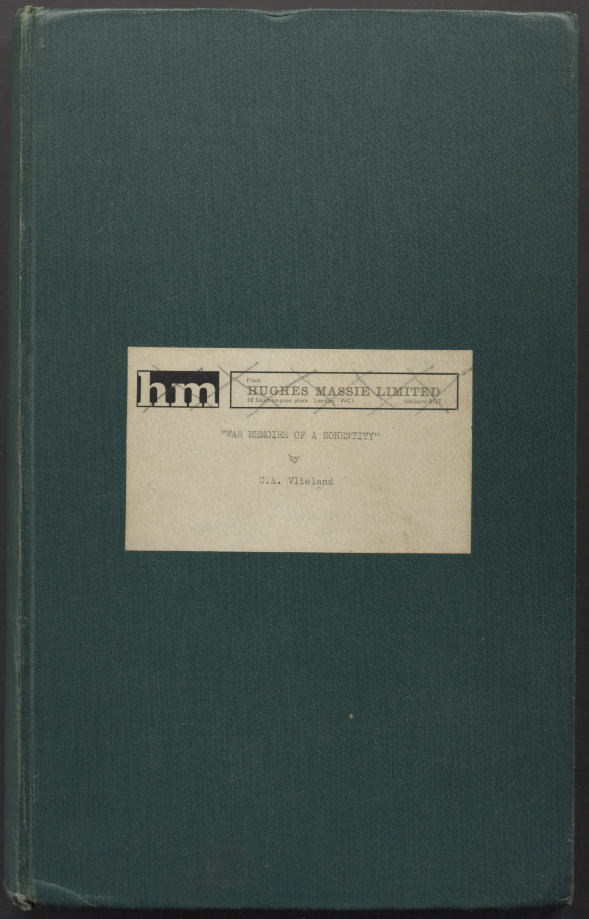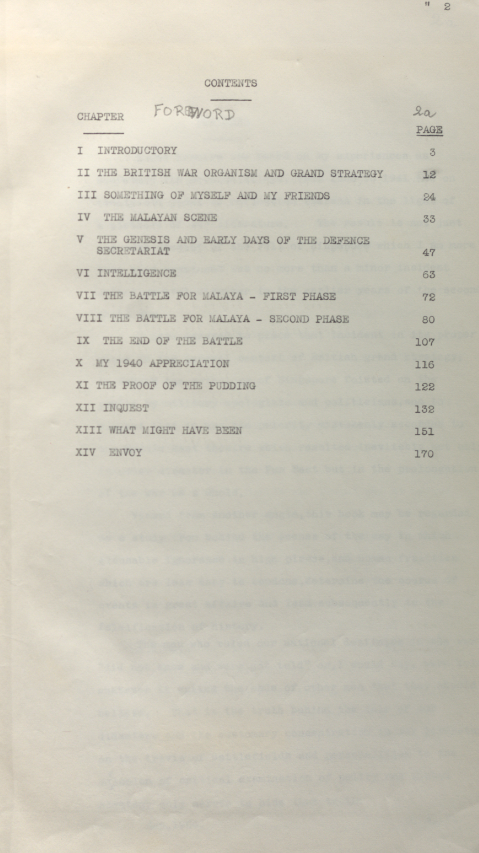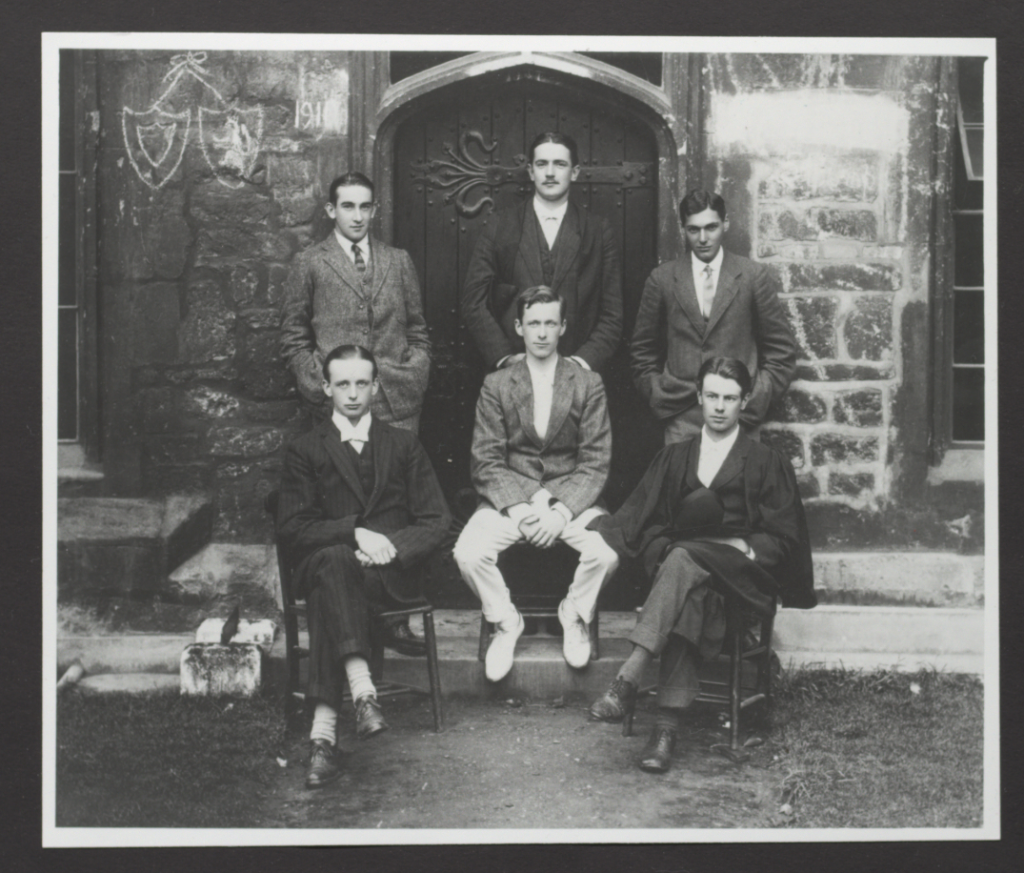By Cathy Williams, Head of Archives & Research Collections, King’s College London Archives
Vlieland, Charles Archibald, 1890-1974, colonial administrator presented the ‘much abridged and expurgated edition’ of his personal memoirs “DISASTER IN THE FAR EAST 1941-2” to the Liddell Hart Centre for Military Archives (LHCMA) in 1965 – only a year after the Centre opened and having received no objection from The Colonial Office as to its publication.
Twenty years after Vlieland’s death, in 1994 the Centre received the unabridged version. Entitled “WAR MEMOIRS OF A NONENTITY” and written in May 1964, this original version begins with a FOREWORD and INTRODUCTORY chapter in which Vlieland explains his motivation for writing: ‘to debunk the mythology of Singapore’ and rebut the ‘falsification of history’.


The cover and title page of Vlieland’s memoirs, including handwritten correction. Vlieland collection.
As an archivist, I’m most interested in the latter but it was Vlieland’s experience as Secretary of State for Defence, Malaya from 1938 to 1941 which inspired his ‘unorthodox statements’; his view from ‘behind the scenes’; and his consequent anger towards those ‘scapegoat-hunting journalists and Army apologists’ who – more than twenty years later – were publishing ‘masterpiece(s) of invention, misrepresentation and ill-informed and ill-natured calumny’. He states that his ‘object’ is not ‘historical truth’ but to shift blame for ‘disaster in the Far East’ away from ‘any individual, military or civilian’ in Malaya when Singapore fell and on to the ‘Powers-that-were’ in London.
There’s an obvious question over Vlieland’s being a self-styled NONENTITY and his assertion that compared with ‘famous men’, ‘less exalted persons’ are ‘often better informed and less biassed’. It’s true that the ‘writings of (those) famous men’ are available in ‘vast volume’ and that ‘records produced by (those) less exalted persons’ are ‘unfortunately rare’ by comparison – but there’s something contradictory in Vlieland’s description of the lack of omniscience among ‘men who get to the top in politics and Services’ and his belief that in 1964 when he wrote these MEMOIRS, he was the ‘only man … both disposed and sufficiently informed to set the record straight’.
I ought to have known. My advisers ought to have known and I ought to have been told.
Vlieland quotes ‘Mr. Churchill’s famous apologia’ – from the fourth volume of The Second World War: The Hinge of Fate published in 1950 – as confirmation that not only did the then Prime Minister not know about the ‘lack of landward defences of Singapore’, but he was ‘completely misled as to Japanese intentions’ – and most significantly for Vlieland, by his own advisers.
And that is why he condemns the ‘inadequacy’ of ‘official documents’. For Vlieland, they record the policies and strategies of ‘men at the summit of affairs’ based on ‘ideas in which they have been led to believe by other men’; and those ‘other men’ are ‘motivated by devotion to pet policies … by lesser loyalties … by inter-Service jealousy … by purely personal considerations’.
It’s difficult to argue with Vlieland’s ‘feeling that the truth, the whole truth and nothing but the truth is rarely to be extracted from archives.’ He reminds the ‘professional historian’ that neither ‘scraps’ nor ‘mounds’ of paper can ‘tell the whole story’; that documents will have been ‘subjected … to a process of selection’ whether ‘blind chance’, negligence, ‘honest error’, or ‘calculated deception’; and that this was ‘very much the case with the archives of war periods’.
MEMOIRS OF A NONENTITY is one of those items which is consciously archival: written with a clear intention to be part of the historical record, to redress what the author perceives as historical imbalance.
Vlieland’s INTRODUCTORY chapter should be compulsory reading, not only for the military historian but for any researcher, as warning against archival ‘booby-traps’. And whatever you think about Vlieland’s motivation for writing his MEMOIRS, he was certainly no NONENTITY – which was very much his point.

View the catalogue record here.
In 1962, the War Studies Department of King’s College London was founded by Sir Michael Howard, lecturer in Military Studies and one of England’s foremost military historians. Two years later, Howard established a Centre for Military Archives at King’s to complement the new department. The Centre’s remit was simple: it would collect the papers of senior defence personnel of the twentieth century. The official launch of this archive was timed for 1964, to commemorate the 50th anniversary of the outbreak of the First World War. In 1973, the archive was renamed the Liddell Hart Centre for Military Archives in honour of Sir Basil Liddell Hart, whose own extraordinary collection of over 1000 boxes of papers is still the single largest, and one of the most often used, in the LHCMA.
2024 thus marks the LHCMA’s 60th anniversary. In those intervening years we have gathered the personal papers of over 800 senior defence personnel, and we thought this birthday year was a great opportunity to showcase just some of the items from the collection. Every month this year we will be publishing a blog post spotlighting one item or collection chosen by a member of staff. We hope you enjoy celebrating with us!
You can read last month’s post about a British Officer in Ghana by clicking here.